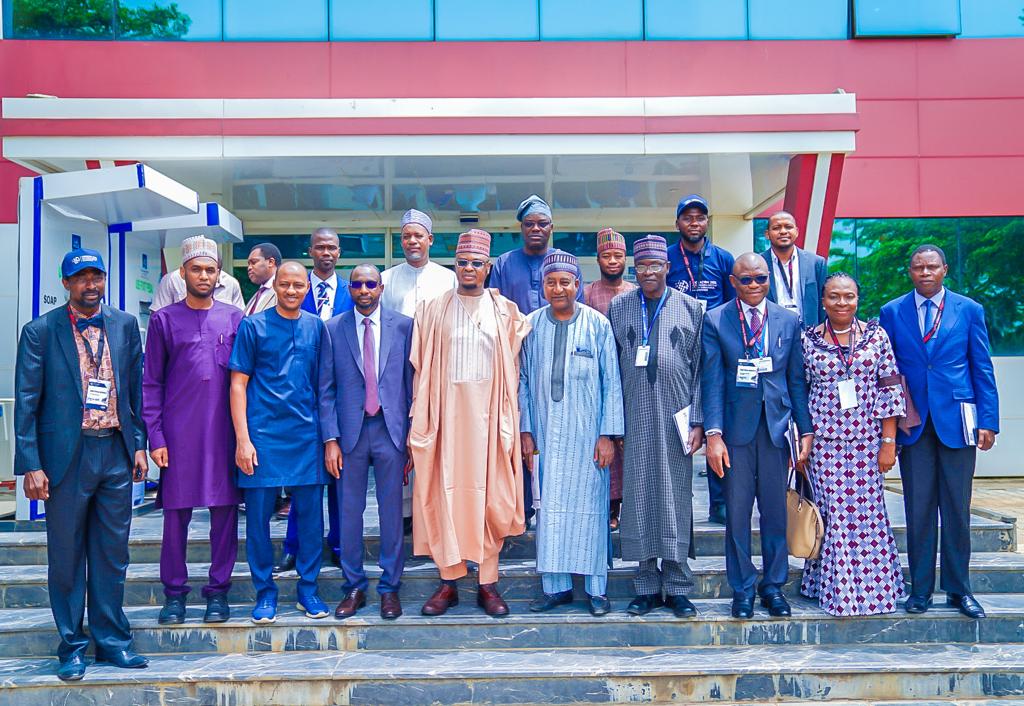Nigeria 5G readiness, impact on Digital Economy Mandate
Keynote address delivered by Professor Isa Ali Ibrahim (Pantami), PhD, FNCS, FBCS, FIIM Honourable Minister of Communications and Digital Economy, Federal Republic of Nigeria at the IEEE NIGERCON 2022 Conferenceat Nile University, Abuja on 17th of May, 2022
I am delighted to deliver this Keynote Address at the IEEE NIGERCON 2022 Conference, which focuses on Disruptive Technologies for Sustainable Development. The choice of this theme goes a long way to show that IEEE Nigeria Section is committed to using technology to support the development on Nigeria’s economy and this is commendable. I wish to thank the leadership of IEEE Nigeria Section for organising this Conference and inviting me to share some thoughts with the distinguished on-site and online audience.
I will be speaking on “Nigeria 5G Readiness and Impact on the Digital Economy Mandate”. Upon resumption as a Minister responsible for the ICT and digital technology sector, I sent a proposal to His Excellency, President MuhammaduBuhari, GCFR, on the need for Nigeria to focus on the development of its digital economy. The proposal included a request for the renaming of the Ministry to the Ministry of Communications and Digital Economy and the inclusion of digital economy to the Ministry’s mandate in line with global best practice.

Mr. President graciously granted that request on the 17th of October, 2019 and our first assignment was the development of a policy document to serve as the overarching policy for this new mandate. We developed the National Digital Economy Policy and Strategy (NDEPS) 2020-2030, to enable Nigeria develop a sustainable digital economy. NDEPS in based on 8 pillars, namely:
- developmental regulation;
- digital literacy and skills;
- solid infrastructure;
- service infrastructure;
- digital services development and promotion;
- soft infrastructure;
- digital society and emerging technologies; and
- indigenous content development and adoption.
The Solid Infrastructure Pillar (#3) and the Digital Society and Emerging Technologies Pillar (#7) are the pillars that align best with the topic of today’s lecture. The solid infrastructure pillar addresses issues around building the infrastructure that can provide accessible and affordable broadband. A Nigeria National Broadband Plan (NNBP) has also been developed to focus on this specific pillar and the deployment of 5G is an important step towards achieving the objectives of the Plan.
The Digital Society and Emerging Technologies pillar will ensure that the gains of the digital economy are mapped to indices of well-being in the lives of ordinary citizens. Emerging technologies are playing a defining role in how we disrupt across different industries. Some of these technologies include:
i.Artificial Intelligence;
ii.Robotics;
iii.Blockchain;
iv.Big Data Analytics;
- Internet of Things (IoT);
- Virtual Reality (VR);
vii. Autonomous (driving) vehicles;
viii. 5th Generation Technology (5G); and
ix.3D printing.
The Importance of 5G Technologies
Talking about 5G to an IEEE audience is much like attempting to sell ice to an Eskimo. This is because of the key role that IEE has played in developing standards for 5G technologies. With regards to 5G, each ‘G’ (generation) of mobile networks is generally based on minimum speed, connectivity and reliability. The following gives the key features for the different generations:
- 1G- allowed us to talk to one another;
- 2G- allowed us to send text messages;
- 3G- gave us broadband data and the Internet; and
- 4G LTE (Long Term Evolution)- much faster than 3G.
5G is very fast- reaching up to 20Gbps over wireless (that is a 100 to 250 times faster than 4G). It also has a super low latency of only 1ms, this makes it basically real time, especially when we note that 4G has a 100 to 200ms delay and normal human reaction time is about 200 to 300ms).
Furthermore, 5G is much more than an evolution from 4G as it translates to a significant growth in number and size of physical infrastructure. The ultra-high speed of 5G will be made possible by huge data centres and complex software at the network core and smaller data centres and antennas near the network end points and subscribers. In terms of density, 4G allows connection to about 1 million devices in 500 square kilometers, while 5G will allow the same number of devices in just 1 square kilometer.
In a nutshell, 5G networks supports the following:
- very-fast data rates;
- extra low latency;
iii. very high density (with up to 100 times more connected devices per unit area);
- more efficient energy usage (can reach 90% energy reduction), which translates into low-power IoT devices in industrial environments boasting 10 years’ worth of battery life; and
v.new and interesting use cases.
Similarly, a number of use cases in 5G exist, including the following:
i.significant number of interconnected devices (IoT);
ii.applications that take advantage of the ultra fast speed of 5G (eg virtual surgeries, autonomous vehicles, and smart agriculture); and
iii.increase in speed and reliability of applications like virtual/augmented reality, mobile gaming, and playing videos.
5G in Nigeria
The National 5G Policy was approved by the Federal Executive Council on the 8th of September, 2021 and it contains all the necessary information guiding the processes and procedures for the deployment of 5G technology in Nigeria. The process for the development of the Policy was initiated in November 2019, when the 5G trials commenced and subsequently took place in a number of cities in the country.
The report of the 5G trials was critically reviewed with a view to studying the health and security implications of deploying 5G in Nigeria. We found it safe and secure to deploy in Nigeria. Leading international organisations such as the World Health Organisation (WHO) and the International Telecommunications Union (ITU), an organ of the United Nations, have also confirmed that the deployment of 5G network has no adverse health effect and is safe. After the trials we embarked on an extensive stakeholder engagement that included adequate public awareness and sensitization.
According to the GSMA, as at the end of December 2021, 200 mobile operators in 78 countries/territories have announced 3GPP-compatible 5G service launches (either mobile or fixed wireless access), including about 9 countries in Africa. With our population and market size, we are on course to become the country with the largest 5G deployment in Africa.
The National 5G Policy is designed and formulated to achieve many goals, including:
- to ensure effective deployment of 5G to cover major urban areas by 2025;
- to ensure security of 5G ecosystem and the protection of data;
iii. to ensure that international best practices and globally accepted standards and specifications are entrenched in Nigeria’s 5G ecosystem; and
- to ensure that the required infrastructure needed for successful deployment of 5G networks such as data centres, power, etc, are catered for in deployment strategies of 5G networks.
Impact of 5G
As mentioned earlier, adopting 5G technologies and rolling out 5G networks will support in the development of Nigeria’s digital economy. As mentioned earlier, the development of NDEPS is geared towards supporting Nigeria’s economy and the focus areas of the government. As such, I will map the impact and potential impact of 5G deployment to the 3 focus areas of the Federal Government, namely the economy, security and transparency.
5G and the Economy
A February 2021 research by the Boston Consulting Group estimates that in the next 10 years, 5G deployment will contribute $1.4 trillion to $1.7 trillion to the GDP of the United States of America and create between 3.8 million to 4.6 million jobs. Similarly, a 2017 Report by the global research firm IHS Markit predicts that by 2035, 5G will enable $12.3 trillion of global economic output, support 22 million jobs have a contribution to the real global GDP equivalent to an economy the size of India- then the 7th largest economy in the world.
Following the successful auctioning of the 3.5GHz in December 2021, Nigeria is set to start enjoying the economic benefits of deploying 5G Networks. With near real time downloads and uploads, 5G will revolutionise every sector of the economy and accelerate digitization, enhance connectivity and ensure reliability. The different sectors of our economy can experience the positive effects of accelerated digitization that 5G networks can provide.
For example, 5G will enable farmers optimize yield, while reducing labour and other costs through the use of high speed drones and Internet of Things (IoTs) that monitor field conditions in real time and provide relevant feedback to the farmers. With 5G in healthcare, cost saving options like remote personalised health monitoring, ability to share data intensive medical records securely and even perform remote surgeries are possible. Such was the case in April 2019, when a surgeon had a successful 3 hour operation on a patient with Parkinson’s disease located 3,000km away from the surgeon.
Our manufacturing sector can also experience benefits that come with the use of 5G technologies. According to a February 2021 Report by Accenture, “5G-enabled factories can see up to 20-30% in overall productivity gains, including improvements of 50% in assembly time, 20% in asset life, and 90% in defect detection.” These are only a few examples to show how 5G can have a positive impact on our economy.
Enhancing Security with 5G
5G will provide very fast and reliable communication for our security personnel and allow then to swiftly access relevant data required to carry out their duties. The time required to access data for records such as vehicle registrations, background checks, etc can be reduced from hours to minutes. 5G will allow for real-time, high quality and data intensive surveillance of relevant areas using high definition cameras.
Robotic systems are automated machines that carry out complicated actions independent of, or in conjunction with, humans. Robotics, when combined with 5G technologies, can be used to replace human operators with machines in high-risk environments.
Transparency through 5G
Emerging technologies like blockchain can significantly improve transparency in the delivery of government services at all levels. The World Economic Forum attests to the potential of blockchain to increase the efficiency and fairness of government systems and, by extension, limit opportunities for corruption.
It can significantly improve transparency in procurement procedures, enhance land and registry systems, ensure that government documents are not accessed by unauthorised personnel, etc. However, with blockchain technology, every device of the network should have an encrypted version of a transaction being authenticated and this can make the system slow.
5G can result in blockchain transactions that are 100 times faster with much lower latency, support for highly dense device connectivity, and much lower operational costs.
A Call to Partnership
We realise that we cannot achieve the lofty goals of the 5G Policy alone. We need partnerships and we are happy to partner with IEEE and other institutions that can support our efforts within the industry. It would be very useful for us to adopt the triple helix model of innovation that is based on collaboration between government, industry and academia. I believe that such partnerships will accelerate the impact of 5G deployments in Nigeria.
Conclusion
In conclusion, I want to commend the IEEE Nigeria for this laudable event and I thank you for your kind attention. We look forward to receiving the report of this Workshop and wish you very fruitful deliberations.




